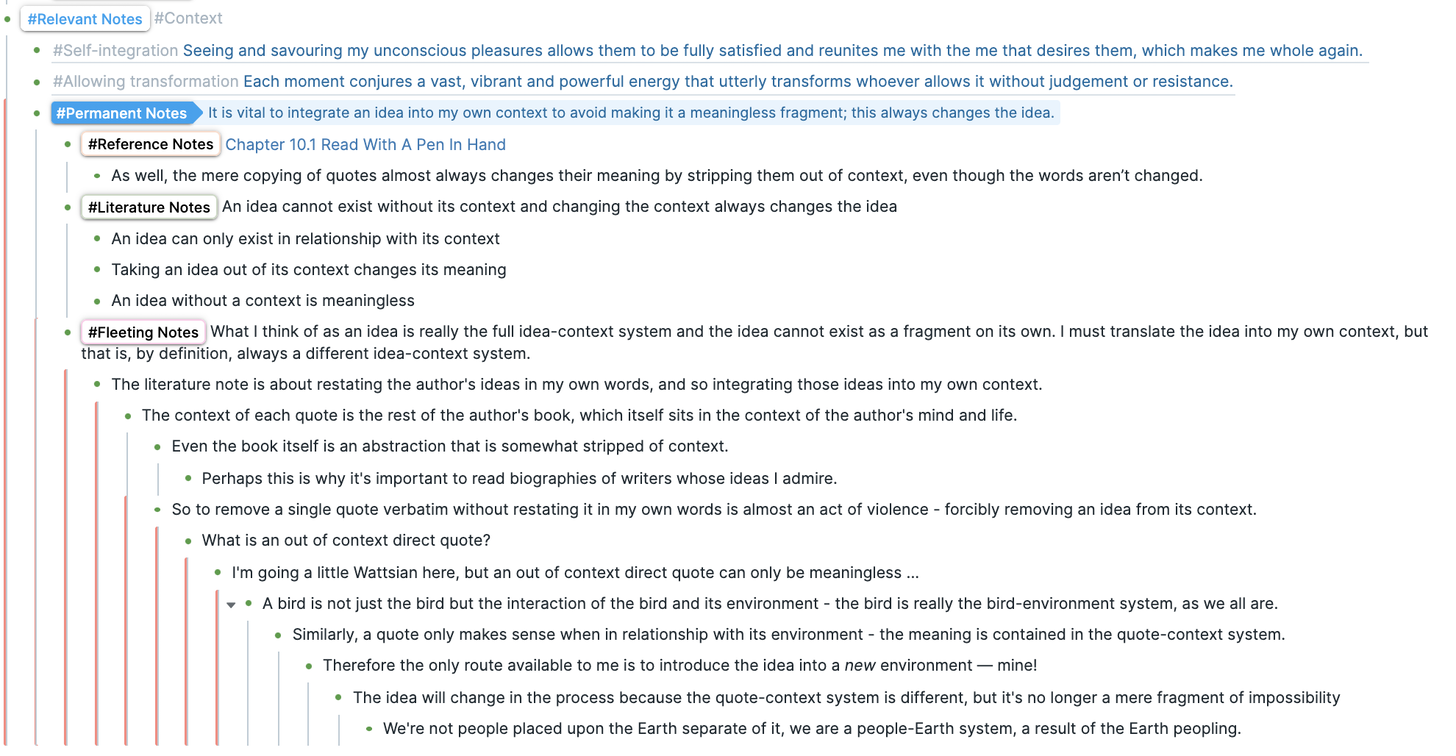An idea cannot exist out of context
“The mere copying of quotes almost always changes their meaning by stripping them out of context, even though the words aren’t changed.” – Sönke Ahrens, How To Take Smart Notes
Picture the scene. You’re happily reading a book when all of a sudden there’s a moving, rising sensation in your solar plexus, which you interpret as “THIS IS IMPORTANT!”. So maybe you get out your trusty highlighter and make a sentence bright yellow.
Maybe you’re someone who loves some Second Brain action, so you faithfully take out your phone to use the Readwise app to OCR the text into Evernote (for everyone else, yes, this is a thing).
Then you carry on reading, safe in the knowledge that you have captured the idea that your solar plexus flagged for you.
Except… you haven’t, really. What you’ve done is take a string of words from the context that gave them meaning and put them into something that resembles, but isn’t entirely, a void.
An idea sits within a wider context: a sentence within a paragraph, a paragraph within a page, a page within a chapter, a chapter within a book, a book within a body of work, a body of work within a life of knowledge, experiences, memories and beliefs.
A life of knowledge, experiences, memories and beliefs with a civilisation, a civilisation within a biosphere.
These relationships matter. What would it mean to separate them, to strip an idea of its context? Such a thing cannot exist!
To explain why, I need to invoke a powerful idea that Alan Watts describes well. A bird is not just the physical bird, the bird is really the whole bird-environment process. When we say bird, the environment is implied, but we always seem to forget that and end up ‘categorising’ and isolating the bird from the world around it.
We’re the same, by the way. We’re not just people placed upon the Earth, separate of it. We are the result of the Earth doing what it does — ‘peopling’.
I’m getting carried away, so let’s get back to ideas and contexts.
Ideas need context in order to exist as ideas, because an idea is really an idea-environment process. It’s a both/and thing! And when we copy them verbatim, just like I did at the beginning of this little essay, we strip them of that.
But this cannot be, for exactly the same reason that a bird cannot exist outside of its environment! It’s an act of ‘conceptual violence’ akin to trying to force light to exist without dark, good without evil, or life without death. Both ‘sides’ of each one are the exact same process, just seen from different perspectives.
This all means that when we take an idea from another context we have to give it a new one. And how we do that is up to us. We can either leave an idea in a rather sterile context, sitting languishing alone in a notebook or computer file, or we can choose to fully integrate it into our context.
Our idea within our body of work, within our life of knowledge, experiences, memories and beliefs, within our perspectives on the civilisation and biosphere that we inhabit (and that we are).
To do this we need to restate what we think the author meant in our own words, which means bringing to bear everything that makes us who we are.
You might argue that this is a bad thing, that the aim in many instances should be to preserve the original idea as faithfully as possible, say in a line of academic inquiry.
But I would argue that this simply isn’t possible and it’s intellectually dangerous to believe that it is. Whatever we do, the idea cannot possibly stay the same, because the context has changed, and remember the idea is not ‘the idea’ but ‘the idea-context process’.
Going further, I would also argue that the only way we can truly understand an idea is to integrate it fully into our own context, because we cannot possibly have access to the totality of the author’s context, not least because much of this is embodied and wordless.
To truly understand an idea we have to let it sink into the core of our being, explore what it means to us and why it stood out to us. We have to allow it to transform us in some way.
Only then can we restate what we think the author meant, but in our own words. If ‘creativity is a remix’ means anything, this is surely what it must mean.
Here’s my crystallised restatement of what Sönke Ahrens said:
“It is vital to integrate an idea into my own context to avoid making it a meaningless fragment; this always changes the idea.”
If you contrast the two statements they may look very similar. But the second one is mine — and I have the notes to prove it. I think it’s close to what he means, but I can never really know for sure. No one can.

By the way, if anything about this image intrigues you, and you are or could be a Roam Research user, I encourage you to take part in the next Roam Book Club
I should stress that taking notes isn’t required for this internalisation process. As Andy Matuschak says: The most effective readers and thinkers I know don’t take notes when reading. No, but they still do the work somehow to integrate what they read into their own being. And this is probably best done by writing.